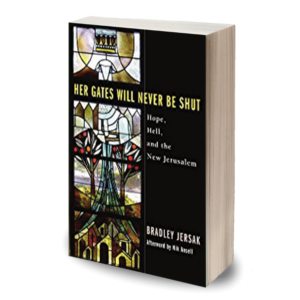Her Gates Will Never be Shut
 I’m continually amazed by how many people ask me about my views of hell. In much of Christianity today we discuss hell as if it is the single greatest reason for believing in Jesus. The challenge of this is that most of our views of hell are shaped more by fictional literature and movies and less by what the Scriptures actually say about it. This ends up creating a religion based on acquiring fire insurance rather than in experiencing Jesus.
I’ve read numerous books on hell that have challenged my thinking over the years but none as good as Brad Jersak’s book:Â Her Gates Will Never be Shut (see: Amazon link). Most Christians only know one view of hell, often referred to either as Eternal Conscious Torment or infernalism. Jersak does an incredible job showing the dominant three views that we find throughout the Bible and then offers a way to make sense of them. It should give Christians a renewed sense of humility when we realize there is no easy way to argue any one of them. Perhaps the best line of the book is when he says, “I am more hopeful of Jesus than I am sure of hell.”
Here are some of my favorite quotes from the book to give you a taste of it:
I’m continually amazed by how many people ask me about my views of hell. In much of Christianity today we discuss hell as if it is the single greatest reason for believing in Jesus. The challenge of this is that most of our views of hell are shaped more by fictional literature and movies and less by what the Scriptures actually say about it. This ends up creating a religion based on acquiring fire insurance rather than in experiencing Jesus.
I’ve read numerous books on hell that have challenged my thinking over the years but none as good as Brad Jersak’s book:Â Her Gates Will Never be Shut (see: Amazon link). Most Christians only know one view of hell, often referred to either as Eternal Conscious Torment or infernalism. Jersak does an incredible job showing the dominant three views that we find throughout the Bible and then offers a way to make sense of them. It should give Christians a renewed sense of humility when we realize there is no easy way to argue any one of them. Perhaps the best line of the book is when he says, “I am more hopeful of Jesus than I am sure of hell.”
Here are some of my favorite quotes from the book to give you a taste of it:
The stubborn fact is that Scripture is richly polyphonic on the topic of hell and judgment—as if by design. Thus, if we become dogmatic about any one position, we reduce ourselves to reading selectively or doing interpretive violence to those verses that don’t fit our chosen view.
Mercy triumphs over judgment; it does not skirt it.
Rather than acknowledge the variety of terms, images, and concepts that the Bible uses for divine judgment, the KJV translators opted to combine them all under the single term “hell.â€
Between the covers of our Bible, the authors plainly teach infernalism, annihilationism, and universalism.
By way of analogy, when the children of Israel fled Pharaoh’s army, the presence of God stood between them as a pillar of fire. To God’s people, he was warmth, light, and comfort. To his enemies, he was darkness and terror. The same is true of the fiery furnace in the book of Daniel. To Daniel’s friends, the fire served to burn only the ropes of their bondage. Meanwhile, it incinerated their captors. In the end, the glory and love of Christ is that fire.
God deals with sin through correction, not punishment.
If the Cross is about love and mercy rather than God’s need to satisfy wrath with punishment, what becomes of hell? Is there a need? Is it punitive? Is it eternal? Or could even hell be swallowed up in the Lordship of God’s eternal love?
Do You Want to Read the Bible Without Falling Behind?
Sign up your email and I’ll send you a PDF to download and use my custom-made reading plan system. There’s no way to fall behind on this system and every day will be different no matter how long you use it!
I’ll send future content directly to your inbox AND you can dive into the Bible like never before.




